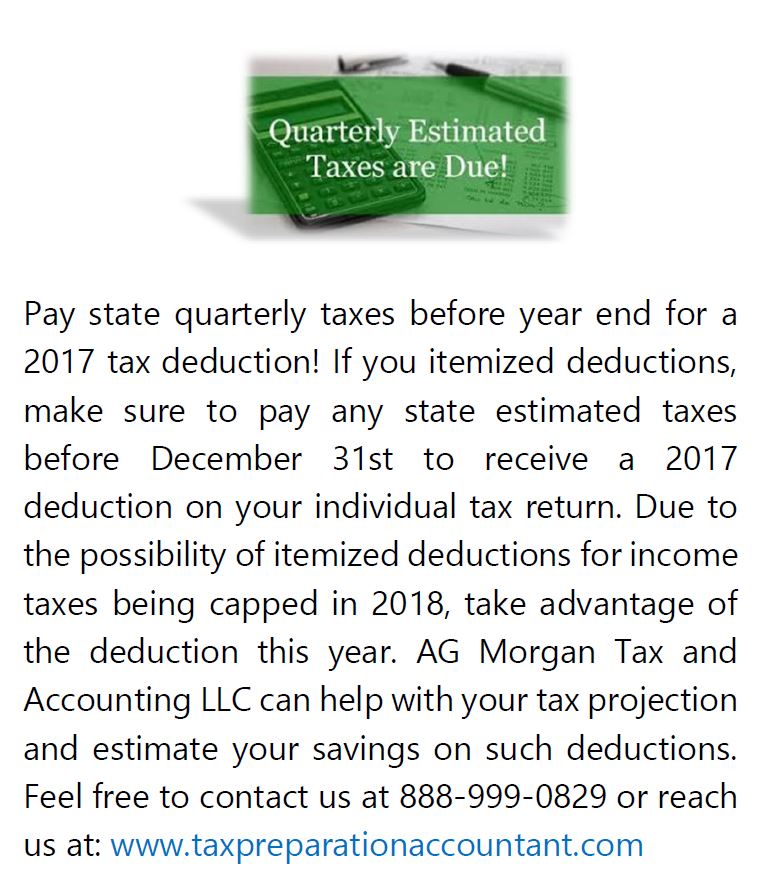|
Hurricane Irma victims in parts of Florida will receive tax relief similar to the victims of Hurricane Harvey. Victims of hurricane Irma have until January 31st, 2018 to file certain individual and business tax returns and make certain tax payments. According to the IRS "The tax relief postpones various tax filing and payment deadlines that occurred starting on Sept. 4, 2017 in Florida and Sept. 5, 2017 in Puerto Rico and the Virgin Islands. As a result, affected individuals and businesses will have until Jan. 31, 2018, to file returns and pay any taxes that were originally due during this period. This includes the Sept. 15, 2017 and Jan. 16, 2018 deadlines for making quarterly estimated tax payments. For individual tax filers, it also includes 2016 income tax returns that received a tax-filing extension until Oct. 16, 2017." To read the entire press release click here. AG Morgan Tax & Accounting wants to remind you...
Tax Extension Deadline The due date for your tax returns are as follows:
Now it’s time to complete the process and we can help. Gather your tax documents AG Morgan Tax & Accounting can email you a list to help you know what to look for and make sure nothing is missed. Just get a hold of us by phone 888-999-0829 or email [email protected] to request a reference list. Once your documents are all gathered, send them our way through our secure link: Upload Tax Documents Here Can’t pay the tax currently due? Some people ask, “What if I can’t pay the full tax?” You need to file your taxes anyway and pay what you can when you can. This will greatly reduce the non-filing penalties and we can work out a payment plan with the IRS and states. Want more updates like this? Like us on Facebook Chelsea Brandt
June 26th, 2017 Each year taxpayers struggle to decide how to file their returns. Doing returns takes time, technical skills and patience. Instead of adding another stress to your busy life, you should hire a professional accountant to do you returns next tax season. Here are five simple reasons why. Time Non-business filers, who make up 68% of all returns spend an average of eight hours on their returns. Your time is valuable. Hiring a professional will eliminate the burden put on you of taking the time to actually sit down (for hour after hour) and do the work! Keeping up with the IRS The IRS states that since 2001, Congress has made nearly 5,000 changes to the Tax Code. That's more than a change per day. The Tax Code is becoming more complex every day it’s challenging to keep up. What if you missed something? Peace of mind is something you gain when hiring a professional to handle your returns. Professionals are trained and experienced to handle your taxes. You can lose money by yourself If you miss deductions or triggering an IRS letter or audit a tax professional can help eliminate errors and ensure your returns are prepared correctly. It can save you money. Lots of it. Your tax preparer can find even just one deduction or tax credit you may have missed. That deduction can easily exceed the fee it costs to have a professional prepare your return. You never know! If you plan to hire a tax professional to prepare your taxes, you will need to gather all of you records. So keep in mind to be organized because it saves your tax preparer time and keeps the fees down! IR-2017-106, June 13, 2017
WASHINGTON — The Internal Revenue Service announced today the addition of several new features to the online account tool first introduced late last year as part of the IRS’s commitment to improve and expand taxpayer services. The online account allows individual taxpayers to access the latest information available about their federal tax account through a secure and convenient tool on IRS.gov. When it first launched in December 2016, the tool assisted taxpayers with basic account inquiries such as information about their balance due and access to the various IRS payment options. Since then, the IRS has added new features allowing taxpayers to:
Before accessing the tool, taxpayers must authenticate their identities through the rigorous Secure Access process. This is a two-step authentication process, which means returning users must have their credentials (username and password) plus a security code sent as a text to their mobile phones. Taxpayers who have registered using Secure Access for Get Transcript Online or Get an IP PIN may use their same username and password. To register for the first time, taxpayers must have their personal and financial information including: Social Security number, specific financial information, such as a credit card number or loan numbers, email address and a text-enabled mobile phone in the user's name. Taxpayers may review the Secure Access process prior to starting registration. As part of the security process to authenticate taxpayers, the IRS will send verification, activation or security codes via email and text. The IRS warns taxpayers that it will not initiate contact via text or email asking for log-in information or personal data. The IRS texts and emails will only contain one-time codes. In addition to the online account, the IRS continues to provide several self-service tools and helpful resources available on IRS.gov for individuals, businesses and tax professionals. Chelsea Brandt
June 19th, 2017 My younger cousin started his first part time job at the age of fourteen at an amusement park. After working two long weeks for $7.25/ hour (the minimum wage in 2012), he was thrilled about receiving his first pay check. He quickly opened his envelope with a huge smile on his face but suddenly the smile transformed into a puzzled frown. He looked up at his parents and screamed, “Who is this FICA and why is he stealing from me?” What (or who) is FICA? Federal Insurance Contributions Act (FICA) tax is a United States federal payroll (or employment) tax imposed on both employees and employers to fund Social Security and Medicare. FICA is comprised of a 6.2 percent Social Security Tax and 1.45 percent Medicare tax. The 6.2 percent Social Security tax helps fund benefits for retirees, disabled people, and children of deceased workers. The 1.45 percent of Medicare tax is used to provide medical benefits for certain individuals when they reach the age of 65. Who is paying the FICA tax? Unlike federal or state income taxes, employers are required by law to withhold a percentage of an employees’ wages for FICA. So how much does the employer pay? The same amount! Employers must pay 7.65% of each employee’s wages so both the employer and employee contribute the same amount. The IRS receives 15.3% of each employee’s wages for FICA tax. FICA Tax Exemptions Some individuals in F-1 and J-1 non immigrant status are exempt from FICA payments for a certain time period. Below are a few of the common FICA tax exemptions: General Student FICA Exemption: FICA taxes do not apply to payments received by students employed by a school, college or university where the student is pursuing a course of study. Qualifying Religious Exemption: Members of certain religious groups could qualify for the exemption, but it must be recognized religious sect opposed to accepting Social Security benefits. The exemption isn’t automatic; you must apply for it by completing Form 4029. Nonresident aliens: A nonresident alien working in the U.S usually pays Social Security tax on any income made here. However, there are some exceptions. For example, foreign students and educational professionals in the U.S on a temporary basis don’t have to pay Social Security taxes. IR-2017-107, June 15, 2017
WASHINGTON – The Internal Revenue Service today warned people to beware of a new scam linked to the Electronic Federal Tax Payment System (EFTPS), where fraudsters call to demand an immediate tax payment through a prepaid debit card. This scam is being reported across the country, so taxpayers should be alert to the details. In the latest twist, the scammer claims to be from the IRS and tells the victim about two certified letters purportedly sent to the taxpayer in the mail but returned as undeliverable. The scam artist then threatens arrest if a payment is not made through a prepaid debit card. The scammer also tells the victim that the card is linked to the EFTPS system when, in fact, it is entirely controlled by the scammer. The victim is also warned not to contact their tax preparer, an attorney or their local IRS office until after the tax payment is made. “This is a new twist to an old scam,” said IRS Commissioner John Koskinen. “Just because tax season is over, scams and schemes do not take the summer off. People should stay vigilant against IRS impersonation scams. People should remember that the first contact they receive from IRS will not be through a random, threatening phone call.” EFTPS is an automated system for paying federal taxes electronically using the Internet or by phone using the EFTPS Voice Response System. EFTPS is offered free by the U.S. Department of Treasury and does not require the purchase of a prepaid debit card. Since EFTPS is an automated system, taxpayers won’t receive a call from the IRS. In addition, taxpayers have several options for paying a real tax bill and are not required to use a specific one. Tell Tale Signs of a Scam: The IRS (and its authorized private collection agencies) will never:
|
|



